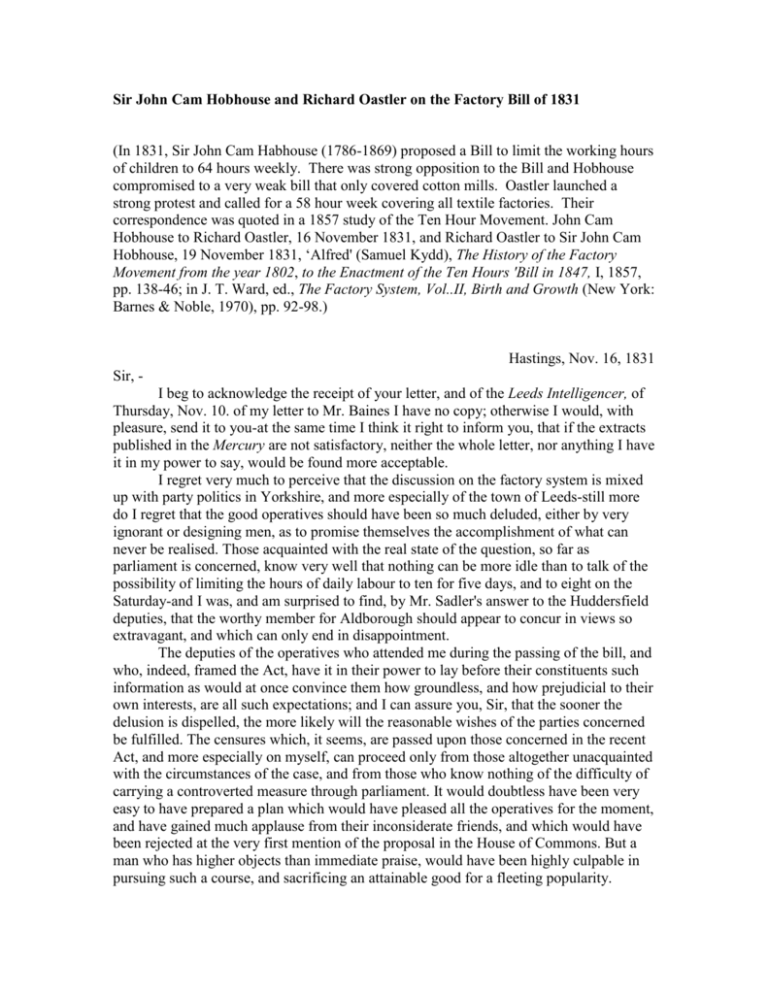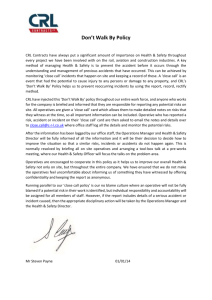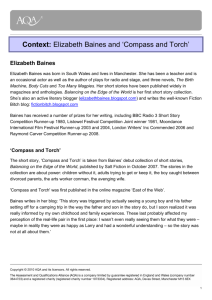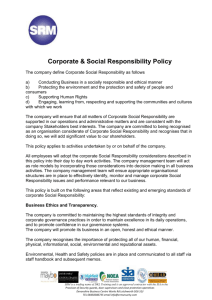Sir John Cam Hobhouse and Richard Oastler on the Factory Bill of
advertisement

Sir John Cam Hobhouse and Richard Oastler on the Factory Bill of 1831 (In 1831, Sir John Cam Habhouse (1786-1869) proposed a Bill to limit the working hours of children to 64 hours weekly. There was strong opposition to the Bill and Hobhouse compromised to a very weak bill that only covered cotton mills. Oastler launched a strong protest and called for a 58 hour week covering all textile factories. Their correspondence was quoted in a 1857 study of the Ten Hour Movement. John Cam Hobhouse to Richard Oastler, 16 November 1831, and Richard Oastler to Sir John Cam Hobhouse, 19 November 1831, ‘Alfred' (Samuel Kydd), The History of the Factory Movement from the year 1802, to the Enactment of the Ten Hours 'Bill in 1847, I, 1857, pp. 138-46; in J. T. Ward, ed., The Factory System, Vol..II, Birth and Growth (New York: Barnes & Noble, 1970), pp. 92-98.) Hastings, Nov. 16, 1831 Sir, I beg to acknowledge the receipt of your letter, and of the Leeds Intelligencer, of Thursday, Nov. 10. of my letter to Mr. Baines I have no copy; otherwise I would, with pleasure, send it to you-at the same time I think it right to inform you, that if the extracts published in the Mercury are not satisfactory, neither the whole letter, nor anything I have it in my power to say, would be found more acceptable. I regret very much to perceive that the discussion on the factory system is mixed up with party politics in Yorkshire, and more especially of the town of Leeds-still more do I regret that the good operatives should have been so much deluded, either by very ignorant or designing men, as to promise themselves the accomplishment of what can never be realised. Those acquainted with the real state of the question, so far as parliament is concerned, know very well that nothing can be more idle than to talk of the possibility of limiting the hours of daily labour to ten for five days, and to eight on the Saturday-and I was, and am surprised to find, by Mr. Sadler's answer to the Huddersfield deputies, that the worthy member for Aldborough should appear to concur in views so extravagant, and which can only end in disappointment. The deputies of the operatives who attended me during the passing of the bill, and who, indeed, framed the Act, have it in their power to lay before their constituents such information as would at once convince them how groundless, and how prejudicial to their own interests, are all such expectations; and I can assure you, Sir, that the sooner the delusion is dispelled, the more likely will the reasonable wishes of the parties concerned be fulfilled. The censures which, it seems, are passed upon those concerned in the recent Act, and more especially on myself, can proceed only from those altogether unacquainted with the circumstances of the case, and from those who know nothing of the difficulty of carrying a controverted measure through parliament. It would doubtless have been very easy to have prepared a plan which would have pleased all the operatives for the moment, and have gained much applause from their inconsiderate friends, and which would have been rejected at the very first mention of the proposal in the House of Commons. But a man who has higher objects than immediate praise, would have been highly culpable in pursuing such a course, and sacrificing an attainable good for a fleeting popularity. Certainly the present Act is far from being so extensive, either in its operation or in its restrictions, as I could wish, but it was tile opinion of the deputies of the operatives, that it secured many advantages, and was a decided improvement of the former legislation on the subject. I had therefore no choice left to me, except of two modes of procedure, namely, to attempt to pass my original bill in the face of all the opposition arrayed against me and at a time when even the very forms and delays of parliament would have defeated me; or to secure so much of the Act as I could pass without opposition of any kind. I did so by waiting day after day for a favourable moment, and at last got through the stages of it at half past three in the morning! ! I will leave you to judge what would have been the result, if I had attempted to force any controverted clause upon the House, any single antagonist would have objected to the time of the discussion, and that obstacle alone would have been quite sufficient to postpone the question from day to day, until the end of the session. My principal opponents are the Scotch flax-factors, and the West of England woollen-factors. The latter I think I might have managed to conciliate. The former gave me no hopes of a compromise, and they sent down so numerous and influential a body of members to the House against me, that resistance was hopeless; at least, as I before said, at that period of the session, and in the then state of public business. If I should be induced to make an attempt to bring back my bill to its original shape, I shall have to encounter the same difficulties, and without appointing a select committee to examine evidence, I fear that even the very introduction of the measure would be opposed with success. Should Mr. Sadler make the effort which he seems to contemplate, of limiting the hours of labour to ten, you may depend upon it he will not be allowed to proceed a single stage with any enactment, and, so far from producing any beneficial effects, he will only throw an air of ridicule and extravagance over the whole of this kind of legislation. I trust that, on mature reflection, that very respectable gentlemen will adopt a more useful course of conduct, and in that case he may depend upon my exertions, such as they are, to second and encourage his honourable labour. You are welcome to give any publicity which you may think desirable to this communication, and I cannot conclude without hoping, that what I have thought right to impress upon your consideration may alter in some degree the opinions you have hitherto entertained as to the best mode of promoting the object which we have, I believe, mutually at heart. Sir John Cam Hobhouse Fixby Hall, 19 Nov. 1831 Sir, -Accept my most respectful thanks for your letter of the 16th instant, and believe me when I assure you I feel grateful to you for the exertions you have made in behalf of poor innocent and defenceless factory children; but allow me also to state, that I exceedingly regret you felt yourself obliged to yield the sacred cause of the poor to the "cold, calculating, but mistaken Scotch philosophers", who seem, very unfortunately, to have an overwhelming influence over the government of this country. Yes, Sir, although I cannot feel otherwise than grateful to you for what you have done, I wish you had manfully met those unfeeling misanthropes (whose God is money, and whose policy is the ruin, degradation, and banishment of the poor), by sound, philosophical and Christian argument, on the arena of the House of Commons, rather than have succumbed between the Committee and the House; then I am sure the laws of this country would nevermore have been disgraced by a statute legalising the working of poor little children nine years old, for twelve hours per day! Say what we may, this is disgusting tyranny, practised under the name of freedom, on the weakest, most innocent, and most abject slaves. In this part of the country very great anxiety is felt on the the subject, and the friends of the children are exceedingly wishful to know who are their enemies. From the general tenour of Your letter to Mr. Baines (so far as he thought proper to publish it,) we were led to believe the 'quarter' to which you were 'obliged to listen', must have been tile government; and yet Mr. Baines says, 'the government are not to be charged with the defeat of the measure'. Then again Mr. Baines says, 'the Board of Trade was inclined to support you until embarrassed by the members of the north'. And you say they 'were supported by the Board of Trade'. Mr. Baines afterwards adds, 'It is to the credit of Yorkshire, that none of the opposition given to the bill proceeded from either its members or manufacturers' . . . I happen to know that petitions were sent against it by some of the manufacturers of Huddersfield, Halifax, and Bradford; and I think Mr. Baines will not dispute that these places are in Yorkshire. Then again, I was informed, by a most respectable and humane manufacturer, who supported the bill with very great zeal and perseverance, and at considerable expense, that Mr. Marshall, of Leeds, opposed the bill . . . It appears to the friends of the measure essentially necessary, that they should actually know their opponents, other-wise they should never know where to direct their energies. If these men did oppose the operatives, they have a right to be informed of it; they would then be able to assist in sending up to parliament interest and argument as strong as theirs. That the Factories Bill should now be made a political electioneering question cannot be a matter of surprise, and, I think, is not one of regret. We have witnessed a friend of emancipation (yourself) defeated by a certain kind of influence, exercised over the feelings and judgment of the representatives of the people ... It is very plain that, if the friends of the measure are not determined, when an election takes place, to send up 'a numerous and influential body of members' in favour of the measure, there can be no hopes of any relief. I am not aware that the question is intended to be mixed up with general politics, but merely so far as to secure votes in its favour from the new members; and I sincerely hope that no members will be returned (where the operatives have any influence, or where the hateful factory system is known) but those who are known to be friendly to a TEN Hours' Bill. I hope the workmen will have the wisdom not to be gulled by the terms whig, tory, or radical, but be determined to support men who support this bill. I really think the 'good operatives' are quite as able to exercise a correct judgment on this question as they are on the very complicated one of 'parliamentary reform'; and you know the King himself and the government made that an 'electioneering question'. We are exhorted, I see, by Mr. Baines, to 'petition parliament'. This may be very right when we have secured good members; but if we are to have our petitions presented to a body of representatives, governed by 'the cold, calculating, but mistaken Scotch philosophers', then I fancy we might as well save ourselves the trouble and expense; and I think it is very plain, from the concluding part of your letter to Mr. Baines (if he quotes correctly), that we have no chance of 'conciliating' the Scotch members without a 'numerous and influential body of members', who will be resolved to do an act of justice to our cruelly insulted and degraded infants. I hope also the landowner, the farmer, the little millowner, the domestic manufacturer, the little tradesman, the shopkeeper, the mechanic, and the artisan, Will ALL join us in this struggle against 'Scotch philosophy'; or they may be assured, EVERY ONE OF THEM, that the system of infantile slavery is a System of UNIVERSAL PAUPERISM; nay, thousands of them have already proved this awful truth. I am truly sorry you despair of ever carrying a bill for 'ten hours for five days, and eight on Saturday'. You have certainly had much experience how the 'influence' is got up 'so far as parliament is concerned'; but we know that hitherto the operatives have neglected to use their influence, and we think we are their friends when we advise them to use it. The 'Scotch philosophers' have hitherto had ALL the influence, and the poor children have only had the support of disinterested philanthropists like yourself; and besides, we are told that, in a reformed parliament, the people will have a more direct influence. I think, then, the friends of the measure should rejoice that the people are determined to make this a political (electioneering) question. I hope the limits sought by the operatives may in the end be realised; nay, in such a case I cannot doubt, till I am informed upon what principle of religion, nature, law, or policy, a child ought to be subject to two hours' longer work per day than a full grown man. When I am made wise on this point, I may perhaps doubt. But all the 'Scotch philosophy' can never make me fear the success of this measure until that question be answered, and even when that point is solved, two others Will arise- viz., If it be beneficial? If it be magnanimous and worthy of the bravest nation in the world? I am not altogether ignorant of the kind of parliamentary influence which makes you doubt the possibilly of carrying even your original measure; and I know something of the difficulties you have to encounter, yet, I have no doubt that a much more extensive measure will be adopted before many years are passed; and although, at present, the idea of working infants ONLY ten hours a day may appear ignorant, ridiculous, extravagant, idle, delusive, and impossible to the legislators of this country, I cannot doubt that, in a very short time, our legislators will hardly believe it was ever possible for a Christian parliament to refuse such an act. I anticipate with gladness the day when yourself, Mr. Sadler, and Mr. Strickland (for he is now, I am happy to say, a TEN hours' man), will be exerting your mighty powers of eloquence for the liberation of the most oppressed beings under the sun. The alteration would at once prevent the unnatural effect of increasing human labour with the increase of machinery; it is this circumstance, proceeding not from the nature of machinery, but from the avarice of man, which makes machinery often appear to be a curse. The natural effect of machinery must be to lessen human labour; the actual effect, under the present system, is to increase it. I rejoice that Mr. Sadler has declared himself a legislator on this subject, in accordance with the principles of his whole life; the declaration is founded on justice, the principles are those of truth, and must ultimately prevail. I am at a loss to conceive how a Ten Hours' a Day Bill can be 'prejudicial to the operatives', or how such a desire can be called 'extravagant and unreasonable'. If this measure is 'rejected at the very mention of the proposition in the House of Commons', none will regret it more than myself; but that unfortunate circumstance will not dishearten its friends. It would only spur them on to greater exertions, and would undoubtedly lead to certain success. 'Immediate praise' and 'fleeting popularity' are, indeed, unworthy motives, and particularly in a legislator. So far as I have experienced, they are the last things a man will be troubled with, if he pursue a straightforward course, and act upon principle. Your 'Cotton Act' is, I believe, an improvement, and I thank you for it; but I do wish you had debated the question in the House. I think, with Mr. Strickland, that it would have been better 'that the abandonment of the bill should have been caused by an open division'. I must apologise for the freedom and length of this epistle, and cannot conclude without thanking you most sincerely . . . As you say that I may give any publicity I may think advisable to your communication, I shall give it, along with mine, to the editors of the newspapers. I feel there ought to be no secrets on the subject. Richard Oastler






